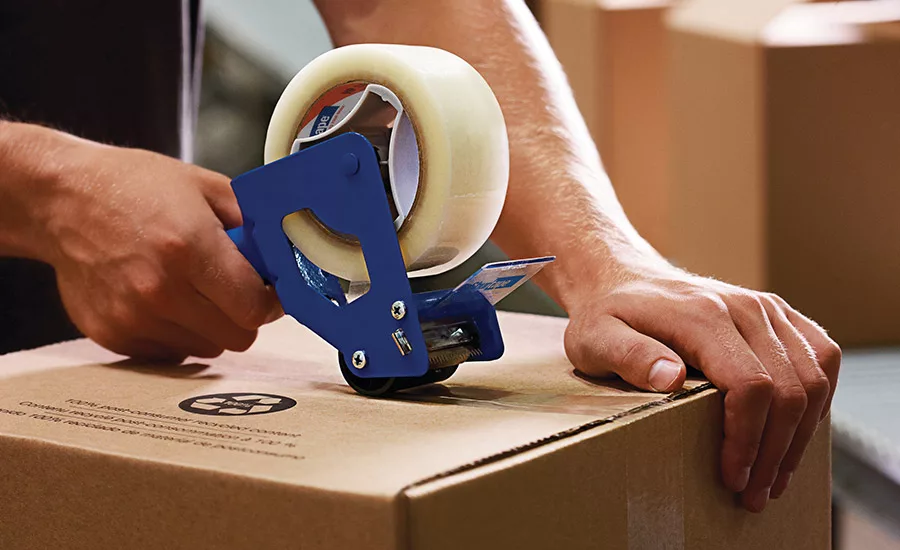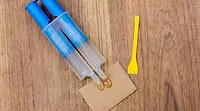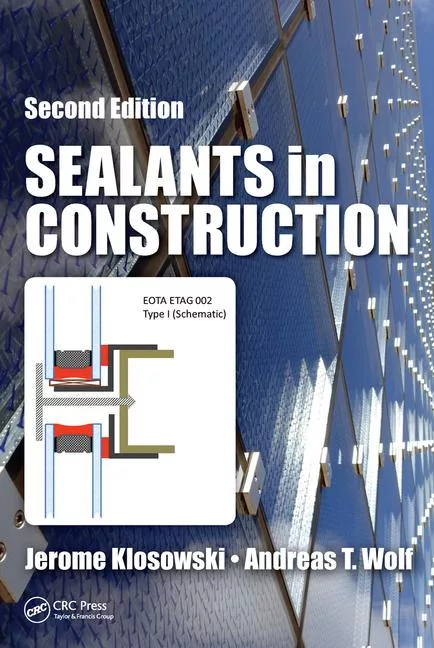Meeting Increased E-Commerce Demands and High Sustainability Standards in a COVID-19 World
Manufacturers are closely examining the cartons used to ship consumer goods, as well as the tapes used on those cartons, all while focusing on sustainability.

Growth in e-commerce is driving manufacturers to focus on sustainability through improved automation efficiency and reduced packaging waste.

Automated application systems can deliver the appropriate amount of wipe-down force, which helps ensure that more of the tape’s adhesive is entangled deep within the fibers of the carton for strong, consistent, and secure seals.


Through proper tape selection and the use of quality application technology, manufacturers reduce the amount of tape needed to secure the carton.
Even before the global pandemic, increasing direct shipment demands were changing the shipping and packaging industry. However, with the heightened growth of e-commerce directly attributed to COVID-19, the shipping industry is processing and delivering an ever-increasing volume of heavier, bulkier, and more valuable packages—including food, beverages, and electronics—directly to the doorsteps of consumers and businesses.
In fact, e-commerce sales in the second quarter of 2020 accounted for 16% of total retail sales, according to the U.S. Census Bureau, a 44% increase from the same time period last year.1 It has been projected that all e-commerce sales would reach over $700 billion by the end of 2020.2
With such an influx of online purchasing, companies are adapting their fulfillment centers to keep up with the tremendous demand on the supply chain. Package and content security are paramount to both consumer satisfaction and companies’ success. To keep goods safe throughout a rigorous shipping environment that is becoming increasingly automated, manufacturers are closely examining the cartons used to ship consumer goods, as well as the tapes that seal those cartons and keep them secure during transit, all while remaining focused on the importance of sustainability.
Fortunately, pressure-sensitive adhesives and tapes, such as hot-melt packaging tapes with advanced adhesive formulations, provide robust box-sealing tape solutions. Hot-melt packaging tapes keep goods secure and lines running smoothly throughout strenuous supply chains. They also are adapting to meet the rising demand for recycled corrugated packaging.
Innovative Adhesive Formulations
Packaging tape is affected greatly by demands placed on the supply chain, which means tape manufacturers look to market trends when evaluating adhesive formulations. With escalating e-commerce retail sales, companies are decreasing shipments to brick-and-mortar retailers and pivoting to ship directly to consumers and businesses. This shift in how the package is transported requires adjustments to the tape that is sealing the carton. Emphasis is placed on the need to have a stronger seal to keep the package secure and ensure goods stay intact.
To address this need, more robust packaging tapes have entered the market. These tapes have special adhesive formulas, offering better initial tack, higher holding power, and a long-lasting seal.
Because hot-melt tape manufacturers have the ability to tailor formulations to suit the carton, they have developed adhesives that enable hot-melt tapes to offer performance solutions for a growing range of substrate materials. This reduces the chance of compromised packages and reduces open returns for manufacturers and distributors. Creating ideal formulations means blending and adjusting raw materials to discover which combinations create an adhesive that will perform on new and different substrates.
“Specific heavy-duty grade tapes have enhanced adhesive formulations designed to penetrate and bond to difficult substrates that have a high degree of variability, such as highly recyclable fiberboard,” says Bradley Dunlap, senior product manager for Shurtape Technologies, LLC. There are hundreds of types of corrugated boards.
The continued influx of recycled materials into the supply chain creates cartons that are becoming increasingly difficult for packaging tape adhesives to adhere to. This forces tape manufacturers to look at reformulation of glues to open that range of performance on continuously evolving substrates.
Increasing Focus On Sustainability
Environmentally friendly practices are becoming more mainstream in the package shipping industry, and e-commerce has a carbon-intensive footprint. Smart business owners are making changes and lessening their environmental impacts with green approaches to supply chain management.
From biodegradable packaging peanuts to corrugated bubble cushioning and mushroom packaging, various options address sustainable packaging for shipping goods to consumers. But these fillers and the goods they protect need to be housed in something. Therefore, companies are becoming increasingly focused on Forest Stewardship Council® (FSC)-certified cartons and recycled corrugated cardboard.
The move to eco-friendly packaging (i.e., cartons that can be circulated throughout the ecosystem) has led to a steady incline in both the percentage of boxes made from recycled cardboard and the percentage of recycled fiber in the cardboard itself, with many packaging operations now using 100% recycled content corrugated cartons. Through the innovation of adhesives, hot-melt tapes create a robust bond to the shorter, chopped fibers that comprise recycled corrugate and also create a seal designed to withstand the single-parcel supply chain systems.
Growth in e-commerce is also driving manufacturers to focus on sustainability through improved automation efficiency and reduced packaging waste. Robust tape is needed to endure the rigors of supply chain automation, as recycled corrugated boxes are quickly moved along processing lines. Inferior tapes will fail, creating downtime and costly packaging re-dos. One premium tape on the market is specifically engineered to address these concerns. This hot-melt packaging tape features a 3.0-mil total thickness and a 50-micron biaxially oriented polypropylene (BOPP) film backing that resists nicks and tears, even in the harshest shipping environments.
Hot-melt packaging tapes provide an instant permanent bond to the substrate; have a higher shear strength; and offer an aggressive, quick stick to the carton. In fact, they have such an aggressive adhesive that they require a special release coating on the tape’s backing.
A release-coated backing, which requires less pull force when unwinding from the roll, is important because it reduces waste by preventing breaking and tearing. This alleviates stress during automatic tape application and allows more tape to come off the roll, virtually eliminating tape waste. Packaging tape manufacturers stress that using the right tape for the right application process enables companies to use less product. (Premium-grade tapes contain better adhesive formulations.)
“Different advances in adhesives are driving packaging tape manufacturers to be more thoughtful, not only of the tape we’re making, but the way it’s being applied,” says Dunlap. “It’s such a critical component of a pressure-sensitive adhesive for it to be applied correctly with the appropriate pressure, especially in automation.”
These aggressive hot-melt tapes are purpose-built for producers implementing more automated packaging lines and shipping cartons that must stand up to the rigors of the single-parcel process. When hot-melt tapes are combined with an automated application system that delivers the appropriate amount of wipe-down force, the added pressure ensures that more of the tape’s adhesive is entangled deep within the fibers of the carton for strong, consistent, and secure seals. Pairing an automated application system with an aggressive, quick-stick hot-melt packaging tape is the best method to ensure a secure seal on recycled corrugated cartons.
Tape manufacturers are looking to transform material management in the shipping industry to reduce waste in other ways as well. Companies make the mistake of using two or three strips of tape to secure a carton because the tape doesn’t have the bonding strength and holding power it needs to provide a secure seal. Better-quality tape cuts down on consumption. Through proper tape selection and the use of quality application technology, manufacturers reduce the amount of tape needed to secure the carton. Using less tape reduces waste and saves money.
According to Dunlap, companies can see about a 20% reduction in tape consumption. For example, if a company is using 25 pallets of tape annually, they can eliminate five pallets of tape and save more than 5,000 lbs of raw materials simply by using the correct tape for the application and applying it correctly.
Increased Automation Spurs Adhesive Advancements
Packaging automation technology is seeing tremendous growth due to COVID-19. The pandemic is directly causing a shift in consumer buying habits away from brick and mortar, creating an e-commerce business revolution. Without increased supply chain automation, businesses will not be able to keep up with the demand.
This surge proportionately affects adhesives and packaging tape manufacturers. “Growth in e-commerce is driving growth in automation, which is driving us to come to the market with better overall total solutions,” agrees Dunlap.
Hot-melt packaging tapes are meeting current needs, but manufacturers are consistently making advancements in adhesive formulations and automated packaging technologies. Always striving to find solutions to meet future needs, tape manufacturers are focused on creating products that are tailored to supply chains and sustainability in order to be a better partner to manufacturers shipping goods directly to consumers.
For more information, visit www.shurtape.com/types/packaging.
References
- “Quarterly Retail E-Commerce Sales, 2nd Quarter 2020,” U.S. Census Bureau, August 18, 2020, www.census.gov.
- Wertz, Jia, “3 Emerging E-Commerce Growth Trends To Leverage in 2020,” Forbes, August 1, 2020, www.forbes.com.
Looking for a reprint of this article?
From high-res PDFs to custom plaques, order your copy today!






